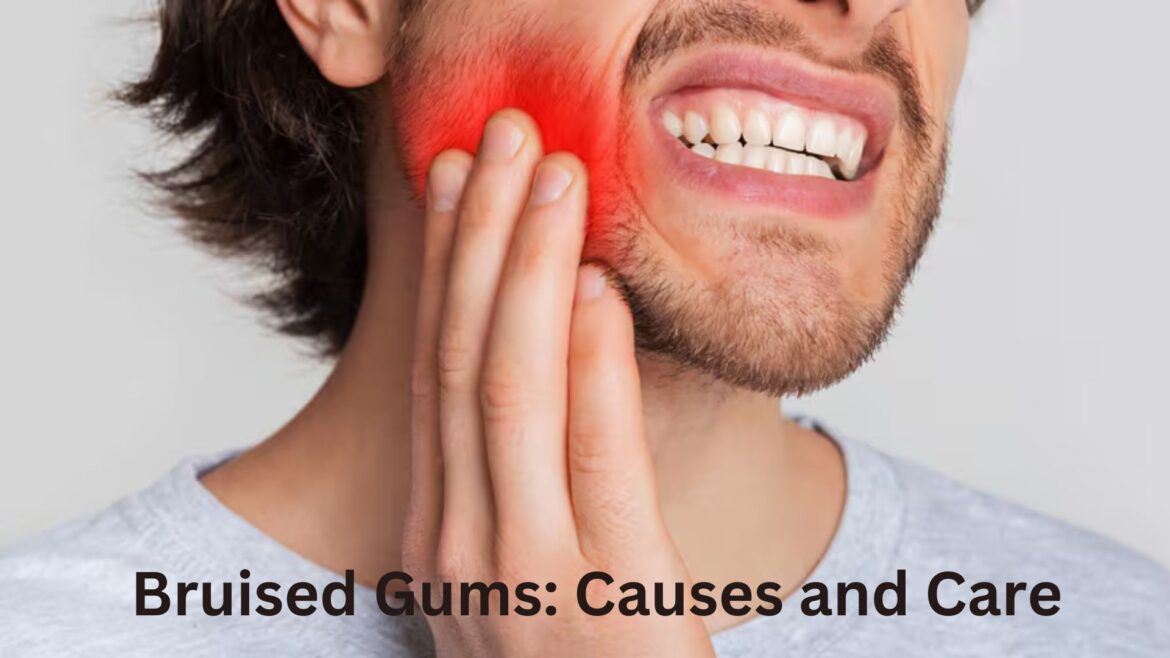
Introduction
If you’ve ever experienced bruised gums, you know how uncomfortable and concerning it can be. Whether it’s from biting something too hard or brushing your teeth a little too vigorously, bruised gums can be both painful and frustrating. But don’t worry—understanding the causes and knowing how to properly care for your gums can make a big difference in your recovery.
In this article, we’ll explore the causes of bruised gums, how to care for them, and the steps you can take to prevent this from happening in the future.
Common Causes of Bruised Gums: Injury, Brushing, and More
There are several reasons why your gums might become bruised. Some causes are minor, while others may require professional attention. Here are some of the most common culprits:
1. Physical Injury to Gums: A Common Cause of Bruising
One of the most obvious causes of bruised gums is physical trauma. You may have accidentally bitten your gum while eating or experienced an injury during sports. The bruise is a result of the tiny blood vessels beneath the surface being damaged.
Anecdote: Sarah, a college student, once accidentally bit down on her gum while eating an apple. Her gum became bruised, and she was worried it might be serious. Fortunately, after following a few simple care steps, her bruise healed within a week.
2. Overzealous Brushing: How Hard Brushing Can Cause Bruised Gums
Brushing too hard with a stiff-bristled toothbrush can irritate and even bruise your gums. While proper oral hygiene is essential, it’s important to brush gently to avoid damaging your gums.
Tip: Always use a soft-bristled toothbrush and brush gently in circular motions. Learn more about using a soft-bristled toothbrush.
3. Gum Disease: A Hidden Cause of Bruised Gums
In some cases, bruised gums can be a symptom of gum disease, such as gingivitis or periodontitis. If your gums are inflamed or infected, they may become more prone to bruising and bleeding.
Effective Care for Bruised Gums: Step-by-Step Healing Tips
Taking care of your bruised gums is essential to speed up the healing process and reduce discomfort. Here’s a step-by-step guide to help you:
Step 1: Rinse with Warm Saltwater: Natural Healing for Bruised Gums
A saltwater rinse can help soothe your gums and promote healing. Simply mix a teaspoon of salt in a glass of warm water and swish it around your mouth for 30 seconds. This helps cleanse the area and reduce swelling.
Learn more about the benefits of saltwater rinse.
Step 2: Apply a Cold Compress: Relieving Pain from Bruised Gums
A cold compress can reduce swelling and numb the area, providing instant relief. Apply an ice pack wrapped in a cloth to the outside of your cheek where the bruised gums are located.
Step 3: Avoid Hard Foods: Give Your Gums Time to Heal
While your gums are healing, avoid foods that could irritate them. Stick to soft, easy-to-eat foods like mashed potatoes, yogurt, or smoothies.
Step 4: Use a Soft-Bristled Toothbrush: Prevent Further Damage to Gums
Switch to a soft-bristled toothbrush to avoid further irritation. Brush your teeth gently, especially near the affected area, to ensure proper hygiene without causing more damage.
Find the best soft-bristled toothbrush options here.
When to See a Dentist: Identifying Serious Issues with Bruised Gums
While bruised gums usually heal on their own with proper care, there are times when you should see a dentist. If your gum bruising doesn’t improve within a few days or if you experience additional symptoms like persistent pain, bleeding, or swelling, it’s time to seek professional help.
Preventing Bruised Gums: How to Avoid Gum Injury and Damage
Preventing bruised gums is all about maintaining good oral hygiene and protecting your gums from harm. Here are a few tips:
1. Brush Gently: The Key to Healthy Gums
As mentioned earlier, brushing too hard can harm your gums. Use a soft-bristled toothbrush and brush gently, in circular motions.
2. Floss Carefully: Avoid Gum Damage with Proper Technique
When flossing, be gentle and avoid snapping the floss between your teeth. This can prevent gum irritation and bruising.
Check out this guide on proper flossing techniques.
3. Visit Your Dentist Regularly: Early Detection of Gum Issues
Regular dental checkups help detect gum issues early on. Your dentist can offer advice on how to prevent gum problems, including bruising.
Conclusion
Dealing with bruised gums can be uncomfortable, but with the right care, they can heal quickly. By following the steps outlined in this article, you can soothe your gums, prevent further injury, and maintain healthy oral hygiene.
If you’re looking for reliable products to care for your bruised gums, don’t hesitate to invest in a soft-bristled toothbrush, a gentle toothpaste, and soothing mouth rinses. These tools can make a significant difference in your oral health journey.


